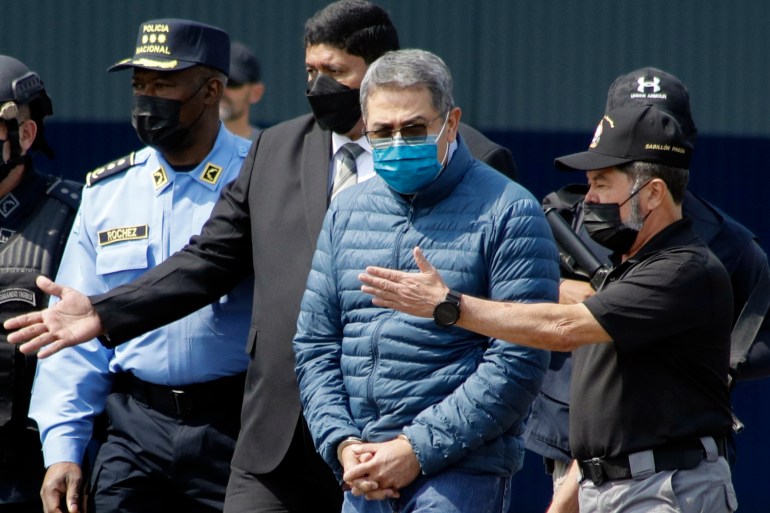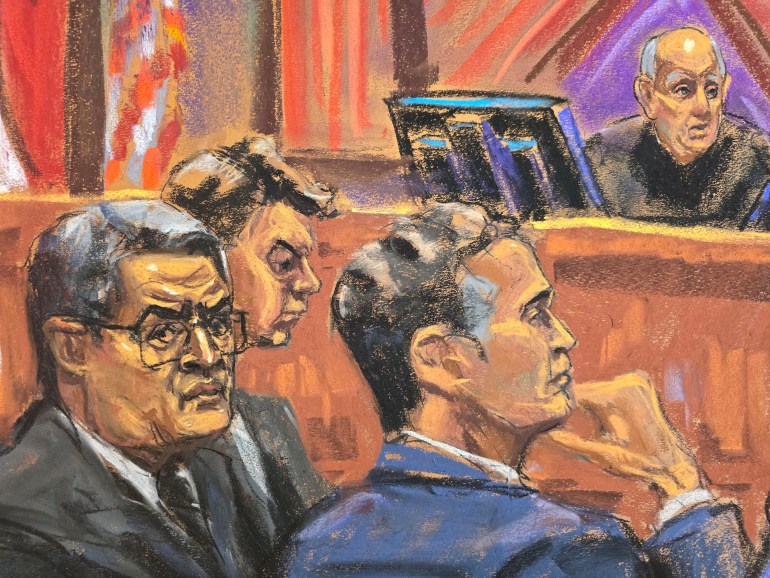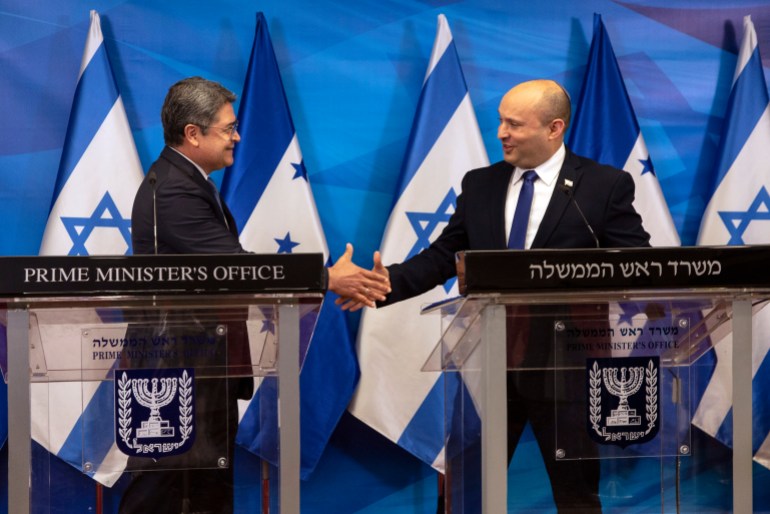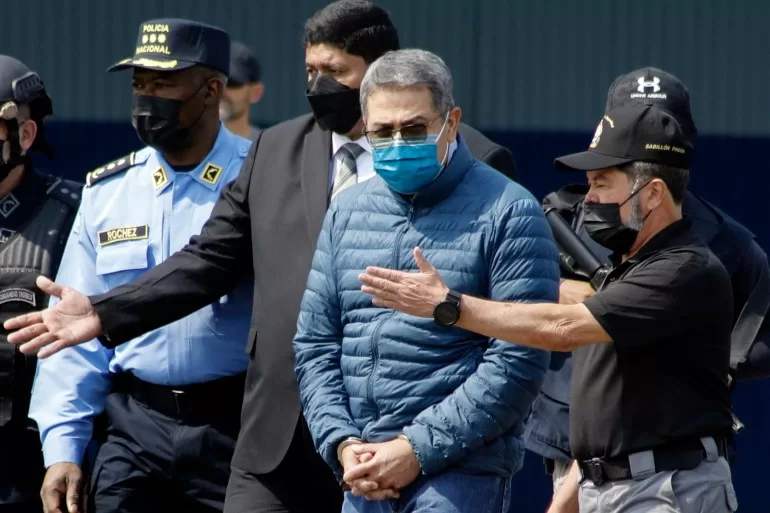It was a major twist in the trial of Juan Orlando Hernandez, a former Honduran president convicted on Friday of participating in a “violent drug-trafficking conspiracy” while in office.
On the witness stand sat a convicted drug trafficker, going by the pseudonym Luis Perez. Originally from Colombia, Perez appeared in a United States district court in New York to testify against Hernandez, whom he accused of being involved in drug trafficking operations.
But as the defence team cross-examined Perez about his relationship with Hernandez, he revealed another alleged participant in the scheme: the Israeli embassy in Colombia.
“We worked with officials at the Israeli embassy,” Perez told defence lawyer Raymond Colon in Spanish while on the stand. “The woman who transported money for us from Honduras to Colombia was an official in the Israeli embassy.”
Perez, who was affiliated with the Sinaloa cartel, accused the unnamed official of laundering between $100m and $150m between 2008 and 2010.
Israeli embassy officials in Colombia declined to comment for Al Jazeera’s story. And Perez’s allegations could not be independently verified.
But experts told Al Jazeera the testimony raised wider questions about Israel’s involvement in Latin America — and how government and drug smuggling in the region have intertwined.

Government officials on trial
Perez, by his own admission, trafficked 200,000 kilogrammes (441,000 pounds) of cocaine from Colombia to northwest Honduras over a period of seven years, starting in 2008.
His buyers allegedly included Mexican drug lords like Joaquin “El Chapo” Guzman and Ismael “El Mayo” Zambada, both leaders in the Sinaloa cartel.
But in 2015, Perez turned himself in to US authorities, in exchange for a reduced prison sentence. Though it was not clear why he turned himself in to US authorities, he said that he left because “the US and Honduran authorities started surveilling people closest to us.”
He served 65 months for conspiring to import cocaine into the United States, down from a possible sentence of 135 months — more than 11 years.
He has since acted as a cooperating witness for US prosecutors, who shield his identity for his safety. He previously testified in the 2022 trial against former Honduran congress member Fredy Najera, who was accused of “operating a large-scale narcotics trafficking organisation”.
Nájera has since pleaded guilty and was sentenced to 30 years in prison. Perez was introduced as “Alexander Monroy-Murillo” at the time of the trial, a Sinaloa strongman operating in Honduras.
In both the cases of Najera and former President Hernandez, Perez accused Honduran officials of seeking campaign contributions in exchange for their participation in the drug smuggling.
Najera, for instance, was said to have used his government office to tip off Perez whenever a police operation threatened his cocaine business.
As for Hernandez — a conservative president popularly known by his initials JOH — US prosecutors say he transformed Honduras into a “narco-state”, partnering with “some of the world’s most prolific narcotics traffickers to build a corrupt and brutally violent empire”.
He was extradited to the US in 2022, shortly after completing his second term in office.
Hernandez, however, has pleaded not guilty to the drug trafficking and weapons charges he faced. Earlier this week, he, too, appeared on the witness stand, refuting any allegations of wrongdoing.
When asked if he took bribes from figures like El Chapo, Hernandez replied simply: “Never.” A jury has since found him guilty on all three charges he faced.

Through diplomatic channels
In his testimony during the Hernández trial, Perez made it clear that the former president had nothing to do with the Israeli diplomatic official who allegedly transported drug money.
Instead, he described the unnamed employee as using her luggage to move the money from Honduras to Colombia, on behalf of the Sinaloa cartel.
“To launder the money, we moved it in a diplomatic briefcase using the diplomatic passport of an official working at the Embassy of Israel in Colombia,” Perez told the jury.
This happened over multiple shipments, Perez alleged. Colon, the defence lawyer, pressed him to specify how many times the trips happened.
“I can’t give an exact number,” Perez replied. “But it happened many times.”
In exchange for participating in the money-laundering scheme, Perez said the official received “3 percent of the money they moved”.
The defence has sought to portray witnesses like Perez as unreliable, motivated to testify for reduced sentences in their own criminal cases.
One of the defence lawyers, Renato Stabile, told the jury in his opening statement, “You’re going to hear from a lot of devils.”
Aid to groups with cocaine ties
The allegations, while unproven, were not a surprise to Alexander Avina, a historian of Mexico and Latin America and professor at Arizona State University.
Avina has researched alleged Israeli connections to drug networks in Central America, and he pointed to a long history of foreign intervention in Honduras.
“Honduras has had a close relationship with Israeli military and arms dealers since at least the late 1970s,” Avina told Al Jazeera.
At the time, Honduras was in turmoil. Tensions were simmering with the neighbouring country of El Salvador, and a series of military leaders had taken the Honduran presidency through coups, though corruption scandals ultimately toppled many of them.
The presidency of General Juan Alberto Melgar Castro, for example, came to an end in the 1978 “Cocaine Coup”, after his government was accused of participating in drug trafficking.
In the middle of the tumult, Avina explained that Israeli military trainers and advisors helped Honduras’s security forces carry out bloody campaigns against leftists and dissidents.
Aviña also pointed out that the Israeli government also provided weapons, advisors and logistical support to the military regimes in neighbouring Guatemala.
Starting in the 1960s, Guatemala was enmeshed in a decades-long civil war, which led to a genocide of Indigenous people. The United Nations has estimated that more than 200,000 people were killed.
Facing pressure over human rights abuses in Central America, the US government collaborated with Israel to supply its allies in the region, even when it could not do so directly.
A New York Times report from 1983 described how Israel, “at the request of the United States”, was sending weapons to Central American countries through Honduras.
Avina also noted that Israel has a history in Colombia as well, helping to train members of the United Self-Defenders of Colombia (AUC), a right-wing paramilitary with links to cocaine trafficking.
“Israel has played a death squad counterinsurgent role throughout the Americas since the 1970s,” Avina said.
“Drugs form part of that counterinsurgency, because government forces have historically relied on narcos to do their dirty work.”

Close relations under Hernandez
In more recent decades, Israel and the US have maintained close ties in Central America, including with President Hernandez.
The former president was a key ally in the US’s regional “war on drugs”, and he had a personal relationship with Israel: He studied there in the 1990s as part of an international development programme called MASHAV.
The Israeli government touted him as “the first MASHAV graduate to become a head of state”.
Hernandez continued his warm relationship with Israel while in office. Under his presidency, Honduras became one of the first Latin American countries to move its embassy to Jerusalem, a controversial move seen as denying Palestinian claims to the city.
As allegations piled up about his ties to drug trafficking rings, Israeli media reported that Hernandez even asked Israel to help prevent his extradition to the US.
Journalist Cristian Sanchez has been attending Hernandez’s trial on behalf of the Pro-Honduras Network, a civil society organisation focused on exposing corruption. He, too, was struck by the allegations about the Israeli official in the court proceedings.
“For the public in the audience,” Sanchez said, “it was impactful to hear that a person in the Israeli embassy would lend themselves to form part of the money-laundering scheme of the Sinaloa cartel.”
In his view, the allegations are part of a wider trend of state institutions becoming complicit in the drug trade.
“What the testimony shows is that the level of infiltration of drug traffickers has gotten to its highest levels, with an ex-president being judged for narco-trafficking — and with a diplomat from the government of Israel in Colombia involved.”
